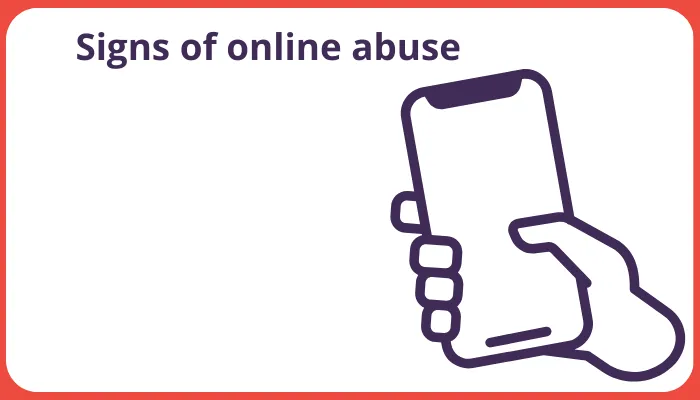Every child's well-being matters.
Types of Abuse Articles
Quick Access
Abuse of Authority
Abuse of Discretion
Abuse of Power
Behavioural Indications
Breast Ironing
County Lines
Cultural Differences (Physical Abuse)
Domestic Abuse
Economic Abuse
Emotional Signs
Exposure to Substance Abuse
Failure to Thrive
Female Genital Mutilation (FGM)
Forced Marriage
Hate Crimes & Targeted Harassment
Impact of Domestic Violence
Impact of Environment
Impact on Development
Institutional Abuse
Isolation
Modern Slavery
Neglect
Online Abuse
Parental Behaviours
Physical Abuse
Radicalisation
Religious Abuse
Restraint
Sexual Abuse
Types of Abuse
Witnessing Domestic Abuse

What Are the Signs of Online Abuse?
Custom HTML/CSS/JAVASCRIPT
Today, young children have access to phones, tablets, and gaming platforms. While technology offers many benefits, it also exposes children, parents, and even nursery and preschool staff to the risks of online abuse.
Recognising the signs of online abuse is crucial for day nursery owners and managers to ensure the safety and well-being of everyone in their community.
Signs of Online Abuse in Children
Becoming Withdrawn: If a child who was once bubbly and outgoing suddenly becomes quiet and isolated, it could be a sign they are experiencing online abuse. They might avoid participating in activities they once enjoyed or seem overly attached to their device.
Secretive Behaviour: Children may start hiding their screens or becoming defensive when asked about their online activities. This secretive behaviour can indicate they are being targeted by bullies or predators online.
Changes in Mood: Look out for unexplained mood swings, anxiety, or signs of depression. A child might appear unusually sad, fearful, or angry after using a device.
Physical Symptoms: Sometimes, online abuse can manifest in physical ways, such as trouble sleeping, frequent headaches, or stomach aches.
Signs of Online Abuse in the Staff Team
Decreased Engagement: Staff who are experiencing online abuse may seem less engaged or motivated in their work. They might be easily distracted or show a lack of enthusiasm for tasks they used to enjoy.
Increased Absenteeism: If a practitioner starts taking more sick days or frequently requests time off, it could be a red flag. They might be trying to avoid online abuse that they are experiencing outside of work.
Behavioural Changes: Noticeable changes in behaviour, such as irritability, mood swings, or a decline in performance, can also be signs of online abuse. Staff might appear stressed or anxious without an obvious reason.
Isolation: A practitioner might withdraw from their colleagues, avoiding social interactions or team activities, indicating they might be struggling with online abuse.
Signs of Online Abuse in Parents
Secrecy and Withdrawal: Parents who are dealing with online abuse might become secretive about their online activities or withdraw from social interactions, including those with their children and nursery staff.
Emotional Distress: Signs of stress, anxiety, or depression can indicate a parent is facing online abuse. They might appear overwhelmed, distracted, or emotionally fragile.
Overprotectiveness: A parent who is experiencing online abuse might become overly protective of their child’s online activities, reacting strongly to any online interactions or expressing excessive worry about their child's internet use.
Changes in Communication: Parents might become less communicative with nursery staff, avoiding conversations or seeming distant and preoccupied.
Taking Action
It is essential to create an open, supportive environment where children, staff, and parents feel safe discussing any concerns. Encourage regular communication, provide resources for online safety, and offer support to anyone who may be experiencing online abuse.
By staying vigilant and recognising these signs, you can help protect your nursery community from the harmful effects of online abuse. Remember, early intervention can make a significant difference in ensuring the safety and well-being of everyone involved.
AUTHOR:- Iona has nearly 10 years of experience supporting nurseries and childminders in curriculum planning, leadership, and safeguarding. Her writing is informed by public information and sector insight, aiming to provide accessible, practical support for professionals working with children. She is part of the On the Button team, helping deliver Well-being, Safeguarding and Complaint Management Software that empowers practitioners to identify concerns early and act confidently.
On the Button provides innovative software tailored to the needs of the early years sector, with a strong focus on EYFS well-being and early years safeguarding. Our tools help senior practitioners to confidently track concerns, maintain robust records, and respond effectively — all while meeting statutory guidance. From early years complaint management to team-wide safeguarding alerts, our platform puts children's safety and emotional health first.
Quick Access
Abuse of Authority
Abuse of Discretion
Abuse of Power
Behavioural Indications
Breast Ironing
County Lines
Cultural Differences (Physical Abuse)
Domestic Abuse
Economic Abuse
Emotional Signs
Exposure to Substance Abuse
Failure to Thrive
Female Genital Mutilation (FGM)
Forced Marriage
Hate Crimes & Targeted Harassment
Impact of Domestic Violence
Impact of Environment
Impact on Development
Institutional Abuse
Isolation
Modern Slavery
Neglect
Online Abuse
Parental Behaviours
Physical Abuse
Radicalisation
Religious Abuse
Restraint
Sexual Abuse
Types of Abuse
Witnessing Domestic Abuse

What Are the Signs of Online Abuse?
Custom HTML/CSS/JAVASCRIPT
Today, young children have access to phones, tablets, and gaming platforms. While technology offers many benefits, it also exposes children, parents, and even nursery and preschool staff to the risks of online abuse.
Recognising the signs of online abuse is crucial for day nursery owners and managers to ensure the safety and well-being of everyone in their community.
Signs of Online Abuse in Children
Becoming Withdrawn: If a child who was once bubbly and outgoing suddenly becomes quiet and isolated, it could be a sign they are experiencing online abuse. They might avoid participating in activities they once enjoyed or seem overly attached to their device.
Secretive Behaviour: Children may start hiding their screens or becoming defensive when asked about their online activities. This secretive behaviour can indicate they are being targeted by bullies or predators online.
Changes in Mood: Look out for unexplained mood swings, anxiety, or signs of depression. A child might appear unusually sad, fearful, or angry after using a device.
Physical Symptoms: Sometimes, online abuse can manifest in physical ways, such as trouble sleeping, frequent headaches, or stomach aches.
Signs of Online Abuse in the Staff Team
Decreased Engagement: Staff who are experiencing online abuse may seem less engaged or motivated in their work. They might be easily distracted or show a lack of enthusiasm for tasks they used to enjoy.
Increased Absenteeism: If a practitioner starts taking more sick days or frequently requests time off, it could be a red flag. They might be trying to avoid online abuse that they are experiencing outside of work.
Behavioural Changes: Noticeable changes in behaviour, such as irritability, mood swings, or a decline in performance, can also be signs of online abuse. Staff might appear stressed or anxious without an obvious reason.
Isolation: A practitioner might withdraw from their colleagues, avoiding social interactions or team activities, indicating they might be struggling with online abuse.
Signs of Online Abuse in Parents
Secrecy and Withdrawal: Parents who are dealing with online abuse might become secretive about their online activities or withdraw from social interactions, including those with their children and nursery staff.
Emotional Distress: Signs of stress, anxiety, or depression can indicate a parent is facing online abuse. They might appear overwhelmed, distracted, or emotionally fragile.
Overprotectiveness: A parent who is experiencing online abuse might become overly protective of their child’s online activities, reacting strongly to any online interactions or expressing excessive worry about their child's internet use.
Changes in Communication: Parents might become less communicative with nursery staff, avoiding conversations or seeming distant and preoccupied.
Taking Action
It is essential to create an open, supportive environment where children, staff, and parents feel safe discussing any concerns. Encourage regular communication, provide resources for online safety, and offer support to anyone who may be experiencing online abuse.
By staying vigilant and recognising these signs, you can help protect your nursery community from the harmful effects of online abuse. Remember, early intervention can make a significant difference in ensuring the safety and well-being of everyone involved.
AUTHOR:- Iona has nearly 10 years of experience supporting nurseries and childminders in curriculum planning, leadership, and safeguarding. Her writing is informed by public information and sector insight, aiming to provide accessible, practical support for professionals working with children. She is part of the On the Button team, helping deliver Well-being, Safeguarding and Complaint Management Software that empowers practitioners to identify concerns early and act confidently.
On the Button provides innovative software tailored to the needs of the early years sector, with a strong focus on EYFS well-being and early years safeguarding. Our tools help senior practitioners to confidently track concerns, maintain robust records, and respond effectively — all while meeting statutory guidance. From early years complaint management to team-wide safeguarding alerts, our platform puts children's safety and emotional health first.

What Are the Signs of Online Abuse?
Custom HTML/CSS/JAVASCRIPT
Today, young children have access to phones, tablets, and gaming platforms. While technology offers many benefits, it also exposes children, parents, and even nursery and preschool staff to the risks of online abuse.
Recognising the signs of online abuse is crucial for day nursery owners and managers to ensure the safety and well-being of everyone in their community.
Signs of Online Abuse in Children
Becoming Withdrawn: If a child who was once bubbly and outgoing suddenly becomes quiet and isolated, it could be a sign they are experiencing online abuse. They might avoid participating in activities they once enjoyed or seem overly attached to their device.
Secretive Behaviour: Children may start hiding their screens or becoming defensive when asked about their online activities. This secretive behaviour can indicate they are being targeted by bullies or predators online.
Changes in Mood: Look out for unexplained mood swings, anxiety, or signs of depression. A child might appear unusually sad, fearful, or angry after using a device.
Physical Symptoms: Sometimes, online abuse can manifest in physical ways, such as trouble sleeping, frequent headaches, or stomach aches.
Signs of Online Abuse in the Staff Team
Decreased Engagement: Staff who are experiencing online abuse may seem less engaged or motivated in their work. They might be easily distracted or show a lack of enthusiasm for tasks they used to enjoy.
Increased Absenteeism: If a practitioner starts taking more sick days or frequently requests time off, it could be a red flag. They might be trying to avoid online abuse that they are experiencing outside of work.
Behavioural Changes: Noticeable changes in behaviour, such as irritability, mood swings, or a decline in performance, can also be signs of online abuse. Staff might appear stressed or anxious without an obvious reason.
Isolation: A practitioner might withdraw from their colleagues, avoiding social interactions or team activities, indicating they might be struggling with online abuse.
Signs of Online Abuse in Parents
Secrecy and Withdrawal: Parents who are dealing with online abuse might become secretive about their online activities or withdraw from social interactions, including those with their children and nursery staff.
Emotional Distress: Signs of stress, anxiety, or depression can indicate a parent is facing online abuse. They might appear overwhelmed, distracted, or emotionally fragile.
Overprotectiveness: A parent who is experiencing online abuse might become overly protective of their child’s online activities, reacting strongly to any online interactions or expressing excessive worry about their child's internet use.
Changes in Communication: Parents might become less communicative with nursery staff, avoiding conversations or seeming distant and preoccupied.
Taking Action
It is essential to create an open, supportive environment where children, staff, and parents feel safe discussing any concerns. Encourage regular communication, provide resources for online safety, and offer support to anyone who may be experiencing online abuse.
By staying vigilant and recognising these signs, you can help protect your nursery community from the harmful effects of online abuse. Remember, early intervention can make a significant difference in ensuring the safety and well-being of everyone involved.
AUTHOR:- Iona has nearly 10 years of experience supporting nurseries and childminders in curriculum planning, leadership, and safeguarding. Her writing is informed by public information and sector insight, aiming to provide accessible, practical support for professionals working with children. She is part of the On the Button team, helping deliver Well-being, Safeguarding and Complaint Management Software that empowers practitioners to identify concerns early and act confidently.
On the Button provides innovative software tailored to the needs of the early years sector, with a strong focus on EYFS well-being and early years safeguarding. Our tools help senior practitioners to confidently track concerns, maintain robust records, and respond effectively — all while meeting statutory guidance. From early years complaint management to team-wide safeguarding alerts, our platform puts children's safety and emotional health first.
Quality Early Years Ltd.,
Dickens House,
Guithavon Street,
Witham, Essex,
England, CM8 1BJ
© Quality Early Years Ltd 2025

Find On the Button
on Social Media

